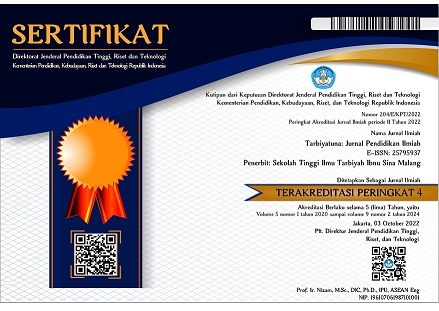Penanaman Akidah pada Anak Usia Dini Melalui Penerapan Kurikulum Berbasis Asma`ul Husna
Abstract
Cultivating belief in the existence of Allah SWT, become the first and fundamental thing in the effort to teach Islam in early childhood, as the Prophet did in the early phase of Islamic Da'wah. Therefore, the proper implementation of the curriculum is required for the planting process to be optimal. One such effort is using the Asma'ul Husna-based curriculum. Research was conducted to find out the implementation of the application of early childhood cultivation through the integration of Asma'ul Husna-based curriculum. Using a qualitative approach, the study was conducted at the Yayasan Pendidikan Muslimat NU Bina Bakti Wanita in Ponorogo District. The results showed that The implementation of Asma'ul Husna-based curriculum is through the integration of 99 Asmaul Husna in all fields of development: (1) the field of the moral, social and emotional development. (2) The field of cognitive development; (3) The field of physcomotor development; (4) The field of language development; (5) The field of Art development. In practice, the implementation was carried out by integrating Asma’ul Husna into the theme and sub-theme of learning in the institution, with the aim that the students easier to know Allah SWT through His traits and creations. Cultivating beliefs in early childhood by integrating Asma'ul Husna-based curriculum in these areas of development, proved able to provide good facilities for educators to be more focused and directed to the delivery of values Creed. As for the learners, it can improve their behavior and morale more directed and controlled. Students become accustomed: mentioning the name of the Lord, Praise God's Creations, prayer before and after carrying out activities, respecting others and the environment, giving thanks to Allah SWT.
References
Arikunto. (2002). Suharsimi Prosedur Penelitian: Suatu Pendekatan Praktis. Jakarta: PT Bima Karya.
Khadim Al Haramain Asy Syarifain (Pelayan Kedua Tanah Suci). (1971). Al Qur`an Dan Terjemahnya. Madina:Komplek Percetakan Al Qur`an Khadim Al Haramain Asy Syarifain Raja Fahd.
Moleong. (2010). Metodologi Penelitian Kualitatif. Bandung: PT Remaja Rosdakarya.
Mustafa, Syaikh Fuhaim. (2009). Kurikulum Pendidikan Anak Muslim. terjemahan Wafi Marzuqi Ammar. Surabaya: Pustaka Elba.
Rohani, Siti. (2014). “Workshop Nasional Tetang Peningkatan Guru RA di Bogorâ€. Bogor: Ikatan Guru Raudlotul Athfal.
Undang-Undang Republik Indonesia Nomor 20 tahun 2003 pasal 1 ayat 4 Tentang Sistem Pendidikan Nasional.
Wibowo, Agus. (2012). Pendidikan Karakter Usia Dini, (Strategi Membangun Karakter Di Usia Emas). Yogyakarta, Pustaka Pelajar.
Zainuddin, A. dan M. Jamhari I. (1999). Akidah dan Ibadah. Bandung: Pustaka Setia.
Zuhaili, W. (1991). Tafsir Al-Munir, Juz XXI. Beirut: Darul Fikri.








.png)
